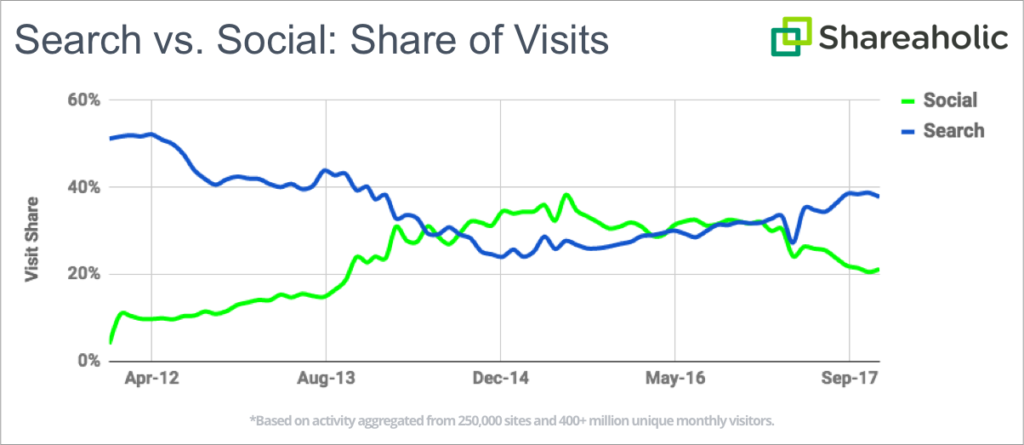When it comes to marketing a brand or business, one of the most debated subjects is what kind of strategy would work to meet organizational goals. In digital marketing, website traffic is among the top priorities of any company, and a ton of research goes to identifying the best strategy that can significantly boost traffic.
Two of these strategies are Search Engine Optimization and Social Media Marketing. Because they’re both capable of directing audiences to a website to increase its visitor count, they are the most common methods to employ. But with the shifting tides on what strategy brings the most traffic referrals, which should you choose to invest in?
To fully understand where each strategy stands, and which can bring you the best results, it’s important to define where the lines are drawn between them.
PrimeView defines (organic) SEO as the “grandfather of digital marketing.” Before social media, one of the best ways for a site to rank was through SEO, and optimizing a website requires attention to several vital aspects, such as backlinks, meta-tags, and authentic content.
On the other hand, social media marketing uses social media sites to gain and direct traffic to a website by building and cultivating a social presence, whether through paid ads or more natural means of communication and community-building.

Despite both aiming to direct traffic at a website, SEO and social media marketing do have certain distinctions between them.
Speed of Execution
- Social gets the word out and obtains responses quickly.
- Search takes longer to produce equivalent results.
Reach
- If you manage to create viral content, you stand a chance of reaching the population cap of the platform you use.
- The reach of search is set by the number of people who search for specific keywords.
Type of Content
- Social media is the perfect platform for content that elicits emotions.
- Informative content, such as how-to articles and industry research is better served by search.
Content Format
- Image, photos, and videos are great for social media.
- Textual content, such as blogs, listicles, news and PR posts, etc. are perfect for search.
Target’s Purpose
- Social media users are more likely to share but less ready to buy.
- Searchers have a specific purpose in mind for searching and are more likely to act on an offer.
Work Required
- Social media takes a lot more constant and consistent work to sustain the hype.
- Search takes some effort to set up initially but will carry itself even when unattended.
Key Performance Indicators
- Social media relies primarily on measuring engagement.
- Search is more attuned to traffic and click-through information.
Considering these differences, what then are the strengths and weaknesses between the two that you should consider?

Social Media
Pros
- The most cost-effective way to gain traffic. Setting up a social media profile is 100% free, and even a small budget on boosting posts or launching social media ads can give you traffic.
- Social media will start sending targeted traffic to your site once you set up an ad.
- Peer recommendation is on your side. People can see what their connections are liking and sharing, which bring these posts to their attention.
- There are fewer algorithm changes. That’s not to say that there haven’t been changes in specific platforms, most notably Facebook, that have negatively impacted businesses, but it’s less of an occurrence.
- Finding out where you went wrong through your Insights is usually more clear-cut.
Cons
- Contrary to popular belief, social media also is highly labor-intensive and requires continuous effort. The engagements you’re getting can die out as quickly as they came.
- Likes, comments, and shares don’t equate to traffic. Some users tend to engage with posts without necessarily checking the site.
- Social media’s site referral traffic rates are dropping. Shareaholic and Parse.ly both report that search has regained the lead over social for traffic referral in early 2017.

SEO
Pros
- Being the top search results for queries and keywords is a surefire way of telling audiences that you’re one of the most reputable sources out there. You build a lot more trust because even Google says you’re that good.
- Search engine algorithms are usually stricter and more experience-driven. This makes sure that you’re giving your audience an easy-to-use and readable website.
- People use search engines first when they’re looking for something. According to a report by Econsultancy, 61% of consumers use search engines to help them in product research before making a purchase.
- You are not limited by time or budget when it comes to staying a relevant search if you keep up with your SERP rankings.
- Search is now overtaking social on website traffic referral. Parse.ly found that Google Search accounts for twice as many referrals (44% of all external referral volume) as Facebook (22%). Meanwhile, Shareaholic reports that, in 2017, the top 6 search engines drove 34.8% of measures site visits as opposed to the 25.6% for the top 13 social networks.
Cons
- SEO is a slow burner. It can take months or years before your website makes it to the top of the SERPs.
- Google regularly changes its algorithms. It can come out of nowhere and drop your rank by a worrying margin. Google also doesn’t outright confirm many of its algorithm updates, which can confuse marketers.
- It’s often difficult to figure out exactly where you’re going wrong, how much money SEO is bringing you, or what strategies will help you improve your rankings.
Which Should You Choose?
- Both strategies have their strengths and weaknesses, but most marketers nowadays agree that it’s vital to use them both. SEO will make sure that your content can be read by search engines, while social media will help you get your content in front of more people faster.
- Shout Me Loud, however, also notes that it may come down to what content you’re delivering with what’ll work better for you. Serious, text-based content may fare better with SEO. Content about the latest news will reach your audiences faster with social media.
- In the end, it’s never wise to just put all your eggs in one basket, as the saying goes. While statistics gathered by Marketing Charts show SEO as the most viable strategy, you can still take a gamble with social media for maximum reach.
Jomer B. Gregorio is a well-rounded expert when it comes digital marketing. Jomer is also known as a semantic SEO evangelist and practitioner. Check out our Digital Marketing Services today and let us help you in achieving positive and profitable results for your business.
